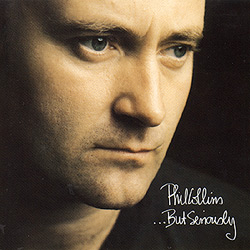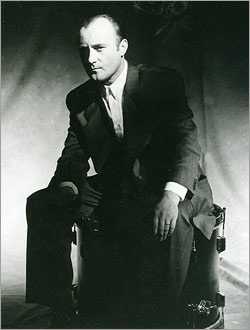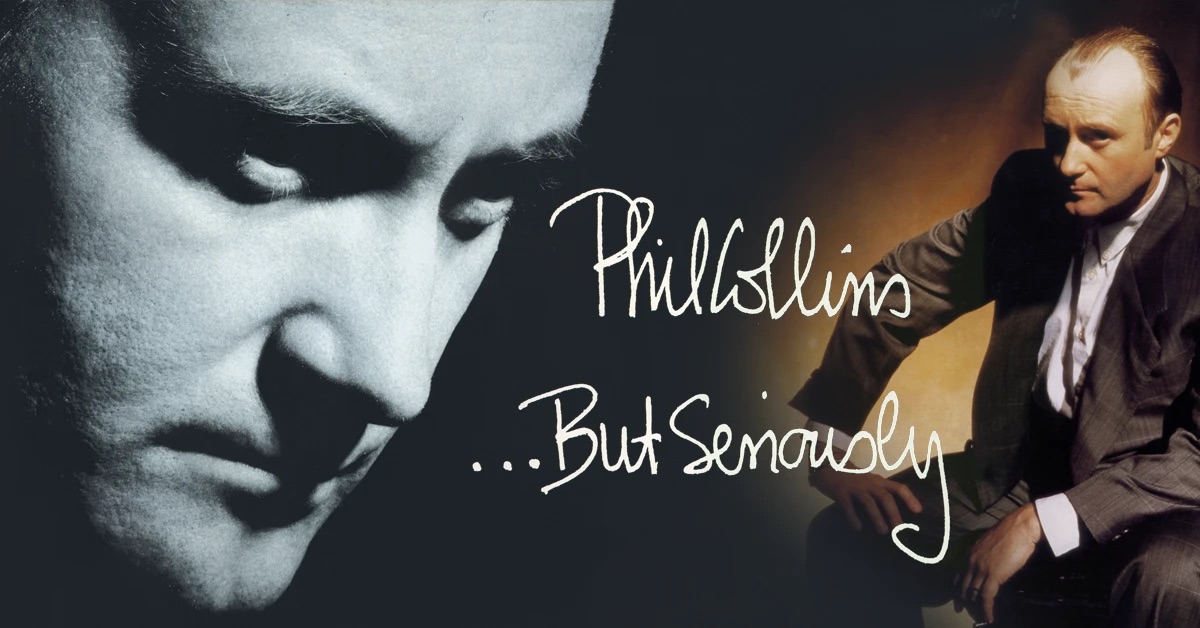- Article
- Read in 5 minutes
Phil Collins – …But Seriously – review
Phil’s 1989 album marked a departure from the topics he covered on previous albums. Hence the title, …But Seriously.
…But Seriously came out in November 1989. A few days before the album was released the Berlin Wall fell and the borders to the GDR were opened. When Phil Collins began to record songs for the album the world looked different. After his first three albums that were mainly about love’s labours won and lost he had rather unexpectedly decided to change course. The title indicated that this album would be about more serious issues. Many Collins fans found this surprising, but it turned out that, judging by sales numbers, …But Seriously would become the second most successful album in his career after No Jacket Required. One could also gather this from the fact that …But Seriously led the album charts in the U.S., the UK and Germany for weeks on end.
Line-Up
The music had changed from No Jacket Required. Phil Collins put away the drum machines and turned once more to live instruments. The list of musicians on this album is quite interesting, too. Bassist Nathan East made his debut on a Collins solo album on Hang In Long Enough – he had worked with Phil Collins before on songs for Eric Clapton and Philip Bailey. Phil was also supported by highly respected musicians such as Stephen Bishop (vocals on Do You Remember?), David Crosby (vocals on That’s Just the Way It Is and Another Day In Paradise), Steve Winwood (Hammond organ on All Of My Life) and Eric Clapton (guitar on I Wish It Would Rain Down). A rather unknown background vocalist by the name of Lynn Fiddmontsang backing vocals on a number of songs; her name has become more familiar for fans since she did the same thing in Phil Collins’ tour band in 2004/2005.
Daryl Stuermer (guitar), Leland Sklar (bass) and the Phenix Horns are of course back, and additional musucians include Pino Palladino (bass) and Dominic Miller (guitar).
The Songs
The album begins contrary to expectations. There is no calm and serious opener but a couple of beats on the snare drum as an intro to Hang In Long Enough. The song does have a serious message, viz. you can do it if you, well, hang in long enough. It was a motto Phil was fond of quoting when he promoted …But Seriously and also in the years that followed. At the time he felt that there were a number of social problems that really bugged him. He tried to draw attention to them and see what that does – and it worked in various ways.
The first really “serious song” on the album is That’s Just The Way It Is. He wrote the song, as he once said, after watching the German anti-war movie All Quiet On The Western Front. The film illustrates the pointlessness of WWI where “enemy” soldiers played football with each other during Christmas though they had been shooting at each other the day before and would again the day after.

Something Happened On The Way To Heaven was not written for …But Seriously but as the final song for the comedy The War Of The Roses (starring Danny DeVito, Michael Douglas and Kathleen Turner). The producers of the film favoured another suggestion and so this song ended up on Phil’s solo record. It is heartily recommended to watch the film and imagine that Something Happened On The Way To Heaven is playing in the scene in which the Rose’s have fallen from the chandelier. The lyrics fit perfectly. Phil wrote this song with Daryl Stuermer.
Whether Do You Remember? is based on a personal experience of Phil Collins is unfortunately not known. But it nevertheless joins the list of songs that deal with separation and its consequences or causes. Alongside I Wish It Would Rain Down, it is the only classic Collins love song on the entire album that is more about the pain of separation than butterflies in the stomach.
Colours is almost nine minutes long – the longest solo song Phil Collins has written so far. It has two parts, a slow beginning and a faster ending that are linked through a brief instrumental. The structure therefore resembles classical Genesis pieces. Colours addresses a topic that was current then, the apartheid regime in South Africa. It is remarkable that several months after the release of the album the South African president de Klerk released Nelson Mandela from prison. This marked the demise of apartheid and made the song more relevant than ever.
I Wish It Would Rain Down is the second song about splitting up. There are some faint vestiges of One More Night. Eric Clapton’s guitar playing and the backing vocals provided by a whole choir introduce a special new flavor into the works of Phil Collins.
Most people who have listened to Another Day In Paradise may have wondered whether or not they themselves have reacted to the pleas of a homeless person as it is described in the song. It may be because it addresses an inconvenient truth and perhaps even a social taboo. It was certainly not without reason that Phil Collins was presented with a Grammy for the most successful single in 1991 for Another Day In Paradise. Collins used the success of the song and the attention it generated for topics of homelessness and poverty to raise money for local charity organizations on his tours, urging people to give to them instead of buying a tour t-shirt.
The song after that is another “serious song”. Heat On The Street deals with the problems of street children. It has a similar message as Hang In Long Enough: Don’t look away, see the problems and deal with them.

All Of My Life and Father To Son are no doubt the most personal songs Phil Collins has ever written. All Of My Life examines the relationship he had with his father. What concerns him most is that he realized only after his father’s death that he felt he had not spent enough time with him. Father To Son on the other hand is a song Phil wrote for his son Simon. Because of the divorce and because Simon grew up at his mother’s place in Canada his father did not have as much time for him as he would have wished to. The song is a kind of collection of good advice.
These two songs are divided on the album by the instrumental Saturday Night And Sunday Morning. While there had been instrumentals on the first two solo albums this tradition had been discontinued on No Jacket Required. …But Seriously features this brief but temperamental composition. The first part illustrates the party mood of a Saturday night while the second represents the hangover of the next morning.
The final song on …But Seriously is another love song. Find A Way To My Heart is actually the only song on the album that is entirely positive both in lyrics and in mood. Though it was never released as a single and never became a hit it was still played on almost all shows until 1997.
All in all
…But Seriously is, judging by the favourite or commercially successful songs, perhaps Phil Collins’ best solo album. It is definitely a consistent album with a well-balanced selection of songs. The only piece that could have been added to it is the cover of Elton John’s Burn Down The Mission. Collins was determined, though, that this album, like No Jacket Required, would not include cover songs. After an album that could not be any more successful he nevertheless managed to release a worthy successor.
by Ulrich Klemt
translated by Martin Klinkhardt

